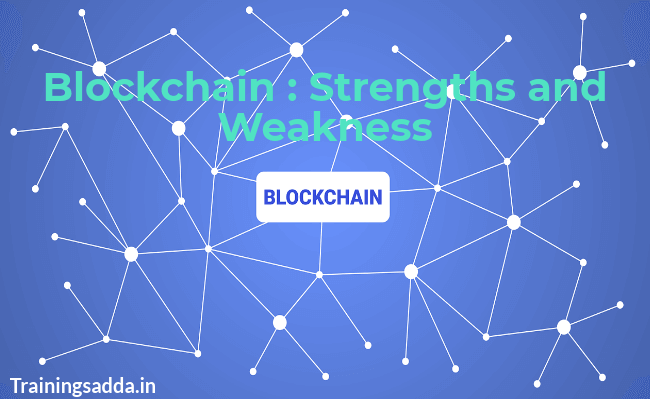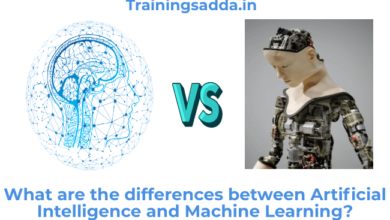Blockchain: The Strengths and Weaknesses

Table of Contents
Blockchain in Scientific and Medical Research:
The creation of the Sophia robot series is a good example of the usefulness of the blockchain. The start-up singularity NET has been able to develop these articulated artificial intelligences with a human face thanks to a blockchain system. No information was lost on the way and the researchers were able to work on the project from several corners of the globe. This lack of fragmentation of work in the blockchain also interested the European Union, which sees applications in the field of health, the management of personal data or in the processing of logistical issues.
What are the strengths and weaknesses of the blockchain?
During the presentation of Bitcoin in October 2008 by Satoshi Nakamoto, the most emblematic point of the project was the Blockchain. Even if at the time we did not imagine all the implications that could have, it was a revolution.
After a dozen years of existence (to be exact we should have written “put into practice” because the blockchain technology existed before the appearance of Bitcoin), the blockchain begins gradually to show its full potential. Unfortunately, there are also still a number of problems related to the youth of this technology. As in everything, there are positive points and other negatives, which we will address in turn. It should be kept in mind that this article is based on the current state of technology in November 2018.
Read more: Ways in Which AR and VR Are Transforming Training in The Manufacturing Industry
Since the evolution in the world of blockchain is fast, some disadvantages can quickly become part of the old history. In the same way, new unsuspected advantages so far can appear.
Advantages of the Blockchain:
Advantage Number 1: Tamper-proof Data, Traceability and Ownership
Once an information is written on a decentralized blockchain, it becomes in practice tamper-proof. Indeed, the principle of the blockchain is to make any data accepted by minors impossible to modify afterwards. However, this is only valid when the blockchain in question is truly decentralized, that is to say, it is not controlled by a single entity but by a large number of people independent of each other.
Find more: The Top Reasons People Succeed In the Machine Learning Industry
This will have a huge impact in a lot of areas where the irrefutability of information is paramount. Here are some examples :
- In the event of a dispute on any subject of which an element has been entered on the blockchain, a judge could easily consult the blockchain and use it as evidence to make his decision.
- It is possible to register the owner of such or in the blockchain. For example, who owns which building, who owns such a work of art, etc. The property would then be guaranteed.
Advantage Number 2: Remove Intermediaries
Thanks to the appearance of Bitcoin, the first concrete case of the use of blockchain technology, it has been possible to carry out “dematerialized” peer-to-peer transactions.
It is now possible to exchange value in a network (on the internet) without a trusted third party, and this is revolutionary!
We make a shortcut, but that means we no longer need the banks.
The fact that a computer protocol organizes exchanges reduces transaction costs:
- no verification, control fees
- automation of tasks
- no mistakes
Advantage Number 3: Protocol Security and Speed
If we take the example of bitcoin, it has never been hacked. All the scandals related to a theft of bitcoin took place either at the level of trading sites, or via scams.
Indeed, to be able to compromise with certainty the integrity of a protocol such as bitcoin, it would be necessary to be able to control 51% of the computing power dedicated to the mining of this crypto-active. This is called a 51% attack.
In addition to maximum security, transaction times are extremely low.
When comparing a Bitcoin transaction to a SEPA transfer, the first is much faster. A transaction in Bitcoin is of the order of a few minutes while a SEPA transfer takes several hours or even days.
Some exceptions are worth noting. When the Bitcoin network is clogged, transactions can take several days and fees can be significant.
This was the case at the end of 2017 with the explosion of the price of Bitcoin and cryptocurrencies.
Advantage Number 4: Creating a New Decentralized Digital Economy
Even if the blockchain does not allow a total elimination of the intermediaries, it can play on the decentralization and allow the emergence of a more decentralized economy.
If we take the internet, only a few actors control almost the entire web: Google, Facebook, Amazon, Apple … The web is now centralized.
When you want to start an online business, you will have to create a website and refer to it on the search engines: Google and Bing.
You want to create an application, it will have to be created under iOS (Apple) and / or Android (Google).
Your business is entirely related to the goodwill of Google. If the latter does not refer to your website or your application, you may as well say that you have not the slightest chance.
The advantage of this decentralization is that creators no longer have control over the companies / organizations they create.
This can prevent censorship, collusion, sale of data, changes in terms of use from one day to another.

Disadvantages of the blockchain:
Disadvantage # 1: Few people trained in this technology
The main flaw of this technology is that few people are still able to master this technology in a professional way. There is almost no institution yet to study crypto currencies.
Some more particular elements explain this lack of professionals:
- The programming of smart contracts requires in some cases the use of a specific programming language. To program an Ethereum contract, you have to master the Solidity language. Some new blockchain projects attempt to use more traditional programming languages such as C++, Java, or Python, but they are usually still in the project stage.
- The blockchain is not yet something usual in the corporate world (despite many tests mainly in large companies).
Very few companies use it and have employees who can manage this component. This is especially true in small and medium-sized structures. - In the long term, this technology will undoubtedly replace certain professions or considerably reduce the number of some of them. There will be resistance from those who risk losing their jobs. This will significantly slow down the training of people who can use this tool.
Disadvantage # 2: Recent and imperfect technology
Blockchain technology is still recent. As a result, not everything is perfect and there is still a lot to do to have something easier to use.
Here are some problems that currently exist with classic blockchains:
- It is not possible to go back. Once a transaction is completed, it is irrevocable. If this seems normal when transferring money to someone, it is a problem when one is mistaken when sending a crypto-active.
These tokens are lost and no one will be able to use them. Only way, a hard-fork like that of the Ethereum Classic.
- Some crypto currency transfer systems are difficult to understand. For example, a beginner will always have trouble understanding the “gas” system of the Ethereum network. It is difficult to know what it is, or what amounts to register.
Conclusion:
As we have seen, the existing disadvantages are mainly due to the novelty of this technology, which must continue its development in order to gain in efficiency.
The benefits enjoyed by the blockchain are absolutely phenomenal. This can significantly improve some aspects of our life. This can revolutionize the way we approach other things now.
Find more: How is Blockchain Impacting on Healthcare Industry?
While there is still a long way to go before technology is adopted in everyday life, it is undeniably something that can significantly improve our lives in the long run.
At present, many world-famous companies are starting to take an interest in blockchain. They analyse how this can improve their operation or that of the goods and services they produce. The same is true for many governments. Some have specific legislation in place to properly regulate this sector, while others have created their own crypto-assets (although they are centralized).
Author Bio:
Sundar working in mippin.com, [mainly writes for Zero turn mowers] as a manager. He is a writer for more than a year. And also working as a freelancer SEO analyst. He helps his clients to grow their business by advising them, how to advertise and market.
Comments
0 comments




